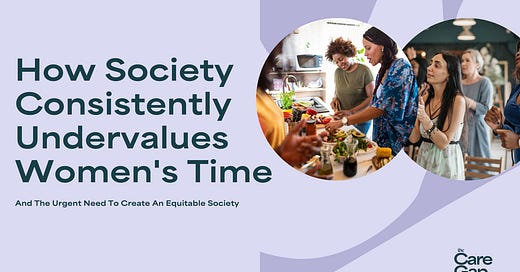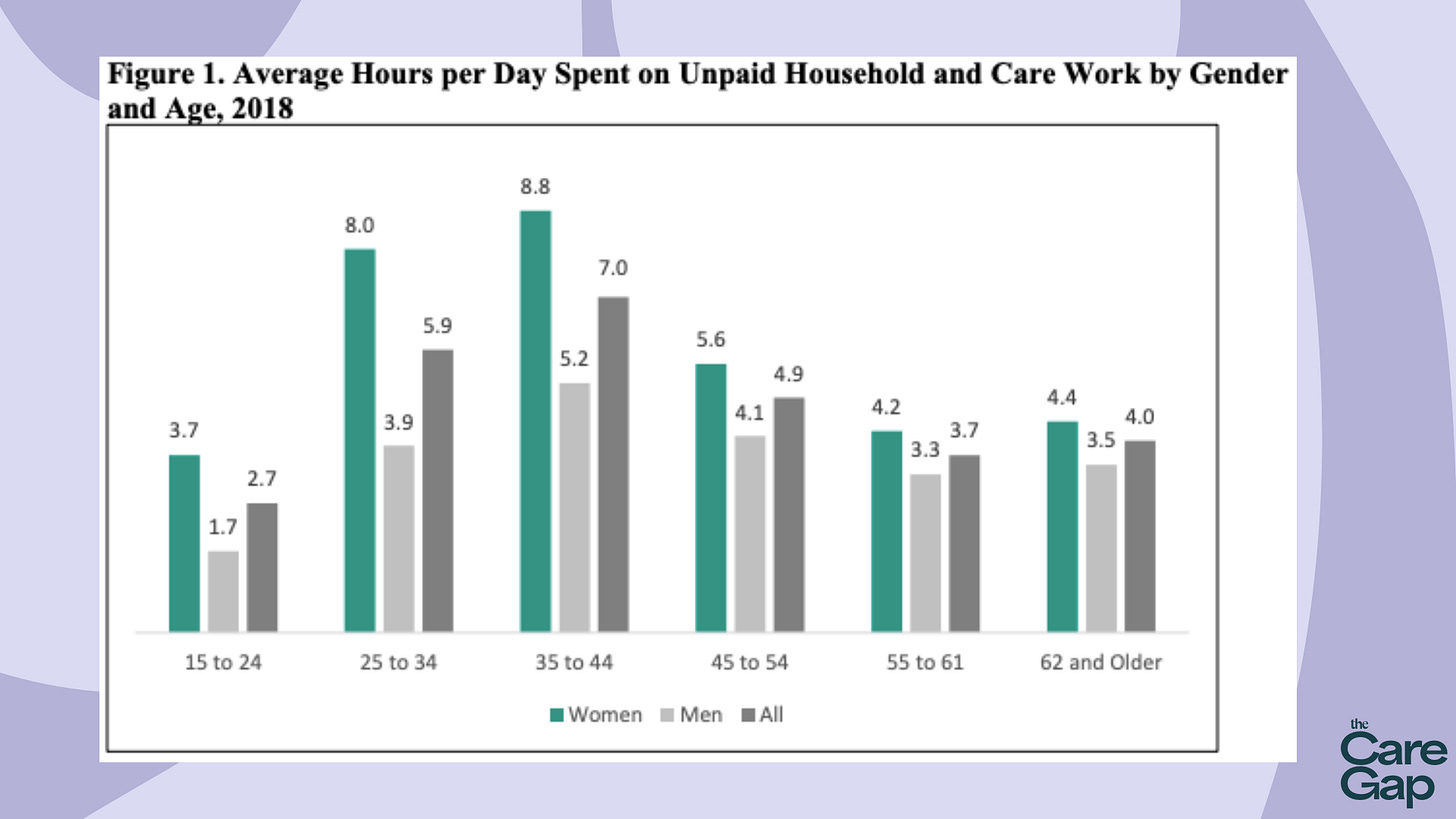How Society Consistently Undervalues Women's Time
And The Urgent Need To Create An Equitable Society
Its been a long hiatus as I battled being locked out of my substack for weeks! I want to deeply apologize to our readers who look forward to this newsletter. In the coming days, we will pick up the pace and ensure we catch up before the end of the summer.
This week, we’re tackling the crucial issue of valuing women’s time. As a society, we often view women's time as an endless resource to be expended freely, while men's time is seen as a precious asset to be carefully managed. Let’s explore the various dimensions of this disparity and discuss strategies for protecting and valuing women’s time.
TLDR:
Undervalued Women's Time: Women's time is often treated as an oversupplied resource both at home and work, while men's time is seen as limited and valuable.
Household Burden: Women spend significant time on household chores, childcare, and planning, which impacts their career progression.
Office Housework: Women are often tasked with non-promotable office duties without recognition or compensation.
Religious Contributions: Women contribute extensively to religious organizations but often lack decision-making power.
Strategies for Change: Systemic changes are needed to value and protect women's time in all spheres of life.
Women's Time at Home: An Endless Cycle
At home, women bear the brunt of household responsibilities. They spend a disproportionate amount of time cooking, cleaning, and managing household activities. Additionally, women often play the role of the "default parent," handling schoolwork, doctors' appointments, recreational activities, and contingency planning. This constant demand on their time limits their opportunities for career advancement and personal development. On average, women spend 2.5 hours more per day on unpaid household and care work than men. This amounts to over 900 hours per year, significantly impacting their time for professional growth and leisure.
Deeply ingrained societal expectations dictate that women are primarily responsible for domestic duties. This cultural norm persists despite increasing female participation in the workforce. Studies consistently show that even in dual-income households, women perform the majority of household chores. Men, on average, contribute less time to these activities, leading to an unequal distribution of labor. When men do participate in household chores, it is often seen as ‘helping’ rather than an equal responsibility. Women are expected to fill in the gaps, ensuring all tasks are completed.
When the demands of caregiving and workplace priorities clash, women are naturally expected to work part-time or take career breaks to manage household responsibilities, leading to reduced earning potential and career progression opportunities. This economic trade-off is often seen as a necessity rather than a choice.
The uneven care gap between men and women is a significant factor contributing to the gender gap and the wage gap. This disparity in unpaid labor responsibilities at home limits women's professional opportunities, hinders their career advancement, and perpetuates economic inequality. Addressing this issue is crucial for achieving gender equity and closing the wage gap .
Women's Time in the Workplace: The Invisible Load
In the workplace, the disparity continues. Men have the luxury of being able to zero-in and focus on their tasks, while women are putting out fires both within the home and in the office. In workplace dynamics, women often feel the need to be nice and accommodating, sending gentle reminders for tasks and managing the office's social cohesion. Women are frequently assigned non-promotable tasks such as organizing events, handling logistics, decorating, and taking notes. These tasks, while essential, are rarely acknowledged or compensated, further devaluing women's time. Managers are 50 percent more likely to ask women to do non promotable work, and women are 50 percent more likely to say yes to these requests when asked. This means that women spend an average of 200 hours per year on activities that do not advance their careers.
There is also the ripple effect of how much we undervalue caregiving as a society. Women are often channeled into roles that are seen as extensions of their unpaid work at home, such as caregiving, teaching, and administrative positions. These roles tend to be lower-paying and offer fewer advancement opportunities compared to fields dominated by men . Occupations dominated by women often have lower pay. This contributes directly to the wage gap, as women are more likely to be employed in these lower-paying sectors.
Closing the care gap can significantly increase women's participation in the workforce, boosting economic productivity. According to the McKinsey Global Institute, advancing gender equality could add $12 trillion to global GDP by 2025 . When women are able to fully participate in the workforce and earn equitable wages, household incomes rise, reducing poverty and improving living standards for families.
Religious Activities: Serving Without Power
Women play an indispensable role in the maintenance and operation of religious organizations worldwide. They are often the backbone of these communities, dedicating countless hours to a wide range of tasks that keep religious institutions functioning smoothly. Despite their significant contributions, women frequently occupy fewer leadership roles and have limited decision-making power, highlighting a profound undervaluation of their time and efforts.
They serve in multiple departments including teaching Sunday school, leading children’s church and youth groups, organizing events, preparing meals, and cleaning the facilities.They run food banks, visit the sick and elderly, and provide support for families in need. This engagement is crucial for the social impact of religious organizations.
Much of the work women do in religious settings is unpaid and often goes unrecognized. This "invisible labor" is essential but seldom acknowledged in formal settings. Even when their efforts are recognized, it is usually in the context of service rather than leadership. Women’s contributions are seen as supplementary rather than integral to the leadership and strategic direction of the organization.
Despite their significant presence, women hold less than 10% of leadership roles in many religious organizations. This includes positions such as pastors, imams, board members, and decision-makers. If the service of women in religious organizations is accepted, then their leadership should be non-contestable.
The Way Forward: Strategies for Change
To address the undervaluation of women’s time and create a more equitable society, we must implement systemic changes in various areas:
Household Responsibilities:
Encourage a more equitable division of household chores and caregiving responsibilities between men and women. This can be promoted through public awareness campaigns and education.
The workplace needs to work for all parents. Implement policies that support families, such as paid family leave, affordable childcare, and flexible work arrangements.
Workplace Dynamics:
Organizations should formally acknowledge and compensate for the non-promotable tasks that women often undertake. Men should also routinely perform these tasks.
Companies should actively work to promote women into leadership roles and ensure equal opportunities for career advancement.
Religious Institutions:
Women are overqualified and long overdue for leadership positions and decision-making in religious organizations.
Recognize and formally acknowledge the vital contributions of women to the functioning of religious communities.
Economic and Social Policies:
Governments should invest in infrastructure that supports caregiving, such as public childcare and eldercare services.
Strengthen policies that promote pay equity and address the wage gap between men and women.
How Can Women Protect Their Time?
Women can take proactive steps to protect their time and advocate for change:
Set Boundaries: Clearly communicate your limits both at home and work. Prioritize your tasks and delegate when possible.
Advocate for Yourself: Speak up about the importance of equitable task distribution. Request recognition for non-promotable tasks and push for systemic changes.
Seek Support: Build a network of support among colleagues and family members. Encourage open discussions about workload and time management.
Educate and Raise Awareness: Share information and resources about the importance of valuing women's time. Engage in conversations that challenge traditional gender roles and advocate for policy changes.
Recognizing and valuing women’s time is essential for achieving gender equity and creating a more just society. By addressing the systemic undervaluation of women's contributions at home, in the workplace, and within religious institutions, we can work towards a future where women’s time is respected and valued equally to men’s. Implementing these changes will not only benefit women but also lead to a more prosperous and equitable society for all.
Global Care Memo
Narrative of Lower Female Labour Participation is False When We Recognise Women’s Work In actuality, more women are working than men. It is just that their work goes unrecognised and the nature of work confines them between the walls of the house. Need recognition and a strong care policy.
Doha, Qatar: The care economy and social protection in Qatar is an essential pillar for enhancing the well being of individuals, family cohesion, and supporting community integration.
Can Care Take Center Stage in the 2024 Presidential Race? Care could be a key issue for voters heading to the ballot box, and may play a larger role than ever in the 2024 presidential election.
UM6P’s Global Summit Shapes Morocco’s Future of Care Economy, Social Policies The Mohammed VI Polytechnic University (UM6P) campus in Sale hosted today the first day of the first edition of the esteemed International Conference on Care (caregiving) Economy and Social Protection.
Lack of child care is preventing small businesses from growing, survey finds
Owners are struggling to retain employees who can’t find affordable or quality care. They want candidates to address the issue this election cycle.
What Day-care Workers and Preschool Teachers Really Think About Their Jobs
Six women get candid on dwindling enrollment, priced-out parents, and crying kids.
As older parents live longer with chronic illness and need more assistance, their caregivers face the challenge of also holding a full-time job. WSJ “Turning Points” columnist Clare Ansberry joins host J.R. Whalen to discuss calls for more businesses to offer elder care-related benefits.
America’s ‘Silver Tsunami’ Crisis Is Only Just Beginning Americans are getting older. By 2032, about a quarter of the US population will be over 65, up from 10% in 1970. And while it’s true that people are both living and staying healthier for longer, many will eventually need someone to care for them. A report by Wells Fargo in March estimated that an additional 1.7 million people will need some form of elder care in a decade.
Nigeria Confronts Its Worst Economic Crisis in a Generation People in Africa’s most populous nation are suffering as the price of food, fuel and medicine has skyrocketed out of reach for many.
Join Us On An Instagram Live With Author: Elissa Strauss
The Care Gap is written by Blessing Adesiyan, Founder & CEO of Mother Honestly Group Inc., the parent company for The Care Gap, Caring Africa, and Caring Blocks where she is on a mission to close the care gap for families, workplaces, and economies globally through content, advocacy, and technology. Follow @blessing.adesiyan @thecaregap for more.












Thank you for keeping the conversation top of mind for everyone.